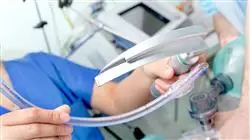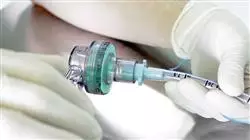University certificate
The world's largest faculty of nursing”
Introduction to the Program
This Postgraduate diploma in Respiratory Pathology and Care of the Tracheostomized Patient in Nursing contains the most complete and up-to-date scientific program on the market”

The objective of this Postgraduate diploma in Respiratory Pathology and Care of the Tracheostomized Patient in Nursing is to update nurses interested in the respiratory therapies that are currently available, so that they can acquire new therapeutic skills and techniques, apply them in their clinical practice, and also contribute to the development of new research.
Patients undergoing respiratory treatment require proper therapeutic compliance, and nursing staff are responsible for empowering these patients and providing them with individualized care; tools that this Postgraduate diploma provides to achieve excellence in care.
The program includes analysis of clinical cases elaborated by experts in respiratory therapies, explanatory videos for the different therapies, photos of the materials used for the different techniques, as well as the most recent developments and innovations.
As this is a program provided entirely online, students can organize their own time and adapt the pace of learning to their own schedule. The contents of this Postgraduate diploma can be accessed from any computer or mobile device and be consulted at any time, as long as students have an internet connection or have previously downloaded them onto their computer.
Bring your knowledge up to date through the Postgraduate diploma in Respiratory Pathology and Tracheostomized Patient Care in Nursing"
This Postgraduate diploma in Respiratory Pathology and Care of the Tracheostomized Patient in Nursing contains the most complete and up-to-date scientific program on the market. Its most important features include:
- Development of clinical cases presented by experts in related, multidisciplinary areas
- Graphic, schematic, and practical contents created in order to provide scientific and practical information on those disciplines that are essential for professional practice
- New developments in Respiratory Pathology and Care of the Tracheostomized Patient in Nursing
- An algorithm-based interactive learning system for decision-making in the clinical situations presented throughout the course
- With special emphasis on evidence-based nursing and research methodologies in Respiratory Pathology and Care of the Tracheostomized Patient in Nursing
- All of this will be complemented by theoretical lessons, questions to the expert, debate forums on controversial topics, and individual reflection assignments
- Access to contents from any fixed or portable device with an internet connection
This Postgraduate diploma is the best investment you can make when selecting an up-to-date program, for two reasons: in addition to updating your knowledge in Pediatric Respiratory and Tracheostomized Patient Care in Nursing, you will obtain a qualification from TECH Global University"
The program’s teaching staff includes professionals from sector who contribute to this training program with their work experience, as well as renowned specialists from leading societies and prestigious universities.
The multimedia content, developed with the latest educational technology, will provide the professional with situated and contextual learning, i.e., a simulated environment that will provide immersion training programmed to train in real situations.
This program is designed around Problem-Based Learning, whereby the professional must try to solve the different professional practice situations that arise throughout the program. This will be done with the help of an innovative system of interactive videos made by renowned experts.
This Postgraduate diploma offers specialization in simulated environments, which provides an immersive learning experience designed to train for real-life situations"

It includes clinical cases that bring program contents closer to the reality of nursing care"
Why study at TECH?
TECH is the world’s largest online university. With an impressive catalog of more than 14,000 university programs available in 11 languages, it is positioned as a leader in employability, with a 99% job placement rate. In addition, it relies on an enormous faculty of more than 6,000 professors of the highest international renown.

Study at the world's largest online university and guarantee your professional success. The future starts at TECH”
The world’s best online university according to FORBES
The prestigious Forbes magazine, specialized in business and finance, has highlighted TECH as “the world's best online university” This is what they have recently stated in an article in their digital edition in which they echo the success story of this institution, “thanks to the academic offer it provides, the selection of its teaching staff, and an innovative learning method aimed at educating the professionals of the future”
A revolutionary study method, a cutting-edge faculty and a practical focus: the key to TECH's success.
The most complete study plans on the university scene
TECH offers the most complete study plans on the university scene, with syllabuses that cover fundamental concepts and, at the same time, the main scientific advances in their specific scientific areas. In addition, these programs are continuously being updated to guarantee students the academic vanguard and the most in-demand professional skills. In this way, the university's qualifications provide its graduates with a significant advantage to propel their careers to success.
TECH offers the most comprehensive and intensive study plans on the current university scene.
A world-class teaching staff
TECH's teaching staff is made up of more than 6,000 professors with the highest international recognition. Professors, researchers and top executives of multinational companies, including Isaiah Covington, performance coach of the Boston Celtics; Magda Romanska, principal investigator at Harvard MetaLAB; Ignacio Wistumba, chairman of the department of translational molecular pathology at MD Anderson Cancer Center; and D.W. Pine, creative director of TIME magazine, among others.
Internationally renowned experts, specialized in different branches of Health, Technology, Communication and Business, form part of the TECH faculty.
A unique learning method
TECH is the first university to use Relearning in all its programs. It is the best online learning methodology, accredited with international teaching quality certifications, provided by prestigious educational agencies. In addition, this disruptive educational model is complemented with the “Case Method”, thereby setting up a unique online teaching strategy. Innovative teaching resources are also implemented, including detailed videos, infographics and interactive summaries.
TECH combines Relearning and the Case Method in all its university programs to guarantee excellent theoretical and practical learning, studying whenever and wherever you want.
The world's largest online university
TECH is the world’s largest online university. We are the largest educational institution, with the best and widest online educational catalog, one hundred percent online and covering the vast majority of areas of knowledge. We offer a large selection of our own degrees and accredited online undergraduate and postgraduate degrees. In total, more than 14,000 university degrees, in eleven different languages, make us the largest educational largest in the world.
TECH has the world's most extensive catalog of academic and official programs, available in more than 11 languages.
Google Premier Partner
The American technology giant has awarded TECH the Google Google Premier Partner badge. This award, which is only available to 3% of the world's companies, highlights the efficient, flexible and tailored experience that this university provides to students. The recognition as a Google Premier Partner not only accredits the maximum rigor, performance and investment in TECH's digital infrastructures, but also places this university as one of the world's leading technology companies.
Google has positioned TECH in the top 3% of the world's most important technology companies by awarding it its Google Premier Partner badge.
The official online university of the NBA
TECH is the official online university of the NBA. Thanks to our agreement with the biggest league in basketball, we offer our students exclusive university programs, as well as a wide variety of educational resources focused on the business of the league and other areas of the sports industry. Each program is made up of a uniquely designed syllabus and features exceptional guest hosts: professionals with a distinguished sports background who will offer their expertise on the most relevant topics.
TECH has been selected by the NBA, the world's top basketball league, as its official online university.
The top-rated university by its students
Students have positioned TECH as the world's top-rated university on the main review websites, with a highest rating of 4.9 out of 5, obtained from more than 1,000 reviews. These results consolidate TECH as the benchmark university institution at an international level, reflecting the excellence and positive impact of its educational model.” reflecting the excellence and positive impact of its educational model.”
TECH is the world’s top-rated university by its students.
Leaders in employability
TECH has managed to become the leading university in employability. 99% of its students obtain jobs in the academic field they have studied, within one year of completing any of the university's programs. A similar number achieve immediate career enhancement. All this thanks to a study methodology that bases its effectiveness on the acquisition of practical skills, which are absolutely necessary for professional development.
99% of TECH graduates find a job within a year of completing their studies.
Postgraduate Diploma in Respiratory Pathology and Tracheostomized Patient Care in Nursing.
Immerse yourself in the exciting field of Respiratory Pathology and Tracheostomized Patient Care and make a difference in the care of patients with respiratory difficulties. TECH Global University presents the Postgraduate Diploma program in Respiratory Pathology and Tracheostomized Patient Care in Nursing, a unique opportunity to expand your knowledge and skills in the field of respiratory health. During the 6-month program, you will have access to relevant and up-to-date information on the most common respiratory pathologies and best practices for the care of tracheostomized patients. You will learn about airway management techniques, prevention of respiratory complications and application of advanced respiratory therapies.
Expand your knowledge in respiratory care with TECH.
With this program, you will develop practical skills in the management of patients with respiratory problems. Online classes give you the flexibility to study from anywhere and at any time that is convenient for you. TECH is recognized for its academic excellence and its innovative and didactic approach. You will be able to interact with other health professionals and share experiences, which will allow you to expand your network and enrich your professional perspective. Don't miss the opportunity to specialize in the care of respiratory patients and make a difference in their quality of life. Enroll now and get ready to excel in the field of respiratory health!







